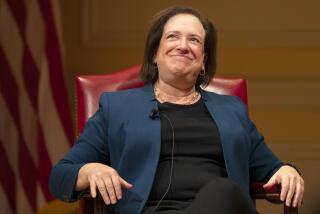Technical Error Could Dissolve SEC Fund Rule
A U.S. appeals court found Friday that the Securities and Exchange Commission made procedural errors in handling a rule requiring more independence among mutual fund directors and said the rule would be struck down if the agency did not reconsider within 90 days.
The rule was adopted by the SEC in 2004 amid scandals in the $9.2-trillion fund industry involving improper trading of shares, often by hedge funds with the complicity of mutual fund managers, at the expense of average investors.
Meant to stiffen the spines of the directors of mutual funds who are supposed to keep an eye on fund managers, the rule requires that the chairmen of fund boards and 75% of board directors have no direct ties to fund managers.
Some fund management companies, including industry leader Fidelity Investments, have fiercely resisted the measure since it was proposed. However, some other fund companies have moved in recent months to comply with it.
The U.S. Chamber of Commerce, a leading business lobbying group, has been fighting the SEC in court on behalf of the rule’s opponents for more than a year.
In the latest legal development, the U.S. Court of Appeals for the District of Columbia Circuit gave the chamber a win and ruled that the SEC erred by not seeking public comment during its brief reconsideration of the measure in June.
The court said it was going to vacate the rule, but it held back and gave the SEC 90 days to reconsider it first, with public comment, before the court’s order takes effect. The 90-day deadline could be extended, the court said.
Because it has been widely adopted, immediately vacating the rule “risks substantial disruption to the mutual fund industry because of the resultant inconsistent governance practices that would arise,” the court said.
An SEC spokesman said the agency was reviewing the latest decision and had no comment.
Chamber General Counsel Steve Bokat said the next step would be for the SEC to publish the rule again as a proposal and to take public comment on it.
“We fully intend to participate in that process. We thought this was a bad rule from the beginning. We continue to believe the commission should not issue the rule,” Bokat said.
Afterward, the SEC would have to vote on the rule again and report to the court. If the rule is re-approved, Bokat said, the chamber would not rule out possibly suing the SEC again.
“If the chamber were dissatisfied with the procedure, we could go back to the court yet again. I’m hoping certainly that that would not be necessary,” he said.
The chamber’s legal challenge to the rule began last year. In June, the court found flaws in how the rule was developed, and it sent it back to the SEC “to address the deficiencies.”
The five-member SEC reaffirmed the rule in a bitterly divided vote pushed through by then-SEC Chairman William H. Donaldson.
The chamber sued again after that and the court in August delayed the rule’s implementation pending further review.
At that time, the SEC’s new chairman, Christopher Cox, said, “The commission will of course comply fully with this and all future orders of the court.”
More to Read
Inside the business of entertainment
The Wide Shot brings you news, analysis and insights on everything from streaming wars to production — and what it all means for the future.
You may occasionally receive promotional content from the Los Angeles Times.










